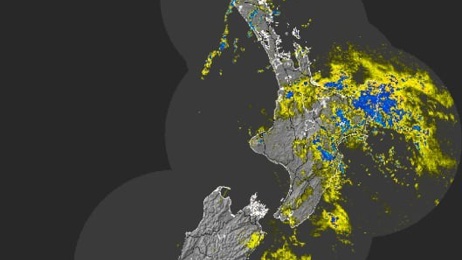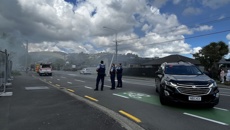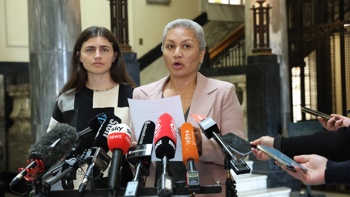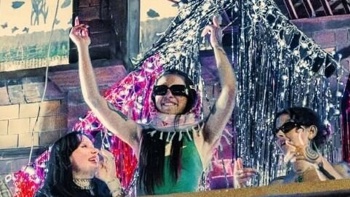This afternoon the Christchurch City Council voted to sign a fixed-price $683 million contract to build Te Kaha, a new multi-use arena.
The price means the CCC will have to invest an extra $150 million, a cost that will be recouped through a rates increase.
While three councillors voted against signing a fixed-price contract for the build, the majority were in support of it.
The decision is monumental for Ōtautahi - a city that has not had a top-level stadium for more than a decade.
Christchurch's City councillors gathered this morning to make the crucial decision on whether the controversial stadium build will go ahead, be put on hold or be scrapped altogether.
That vote came this afternoon.
Whatever way the vote goes the decision will be monumental for Ōtautahi - a city that has not had a top-level stadium for more than a decade.
The meeting began at 10am with scheduled submissions including representatives from Hospitality New Zealand, the Central City Business Association and Crusaders and Canterbury Rugby.
Elected members then heard a detailed description of the proposed stadium and its economic benefits from Te Kaha Project Delivery Limited.
They heard the fixed-price contract to build the stadium - announced earlier this week -was "a very good deal in this market".
There was "very little" risk that the cost estimated for the council - $682 million - would increase.
This afternoon a financial report will be presented and explained.
The elected members will then debate the issues and cast their votes.
Scroll down for more on the voting options and what the Mayor and councillors heard this morning.
TE KAHA - WHAT CANTABS AND KIWIS WILL GET FROM THE STADIUM
It is estimated that over 25 years Te Kaha would collect a whopping $462.2 million.
Each year it would pull in $3.6 million from sporting events, $10 million from international concerts and $5 million from other events.
Councillors are also hearing details of the venue specifics and what it could offer not just to the public but for corporate clients, trade shows and expos.
The stadium would be able to host three large concerts and four "reduced mode" concerts each year as well as All Blacks test, seven Super Rugby matches, five domestic rugby games, one soccer, one rugby league and two "other rugby" fixtures.
It could also host tennis and boxing events as was a "flexible" venue and a "mega event" every six years.
There would be 32 food and bevarage outlets, multiple bars and areas for kids and students.
Te Kaha would also boast parenting rooms, passenger lifts, escalators and world-class lines of sight from every seat.
The project aimed to support "measurable" action in climate change and a range of factors including solar and energy-efficient lighting would be used to make sure the stadium was environmentally friendly.
There would not be any car parking on site in a bid to "change behaviours around private car use".
Bike and scooter parking will be plentiful.
Councillors were assured that the fixed-price contract was the best option for the project.
Barry Bragg, Board Chair of Te Kaha Project Delivery Limited, said the contract was "lump sum" and there would be "no cost escalation".
He said a key clause in the deal was that the contractor had to deliver a fit-for-purpose facility within the agreed scope.
Bragg said there were "very few risks sitting outside the contractor's responsibility".
"We are confident we can deliver," he said.
The board recommended the council approve the contract today so work could commence.
After the presentation of this and two other reports, councillors will be able to ask questions before beginning their debate and voting process.
The meeting is expected to take much of the day.
At 10am Dalziell opened the meeting with words of advice to councillors.
"This is not a straightforward decision to make, it is not an easy decision to make," she said.
"There are a range of factors… the diversity of communities we represent and their interests."
/cloudfront-ap-southeast-2.images.arcpublishing.com/nzme/QVAF7IUHXJ7NNHOJQ2DW6ZJC5U.jpg)
Dalziell said the council must also take a "sustainable development approach" and consider carefully the "reasonably foreseeable needs of future generations".
They also had to balance competing interests.
"You must exercise your vote based on your assessment of how this best represents the interests of the district as a whole," said the mayor.
"The responsibility lies with each and every one of you individually."
WHAT SAY THE PEOPLE? PUBLIC SUBMISSIONS ON STADIUM EXPLAINED.
Key themes from the public submissions were shared with the council.
"They're fed up of missing out on events because of the shortcomings of the temporary stadium," a council staffer told councillors.
"Just get on with it… without any further delays."
Public submitters were "prepared to shoulder a rates increase if that's what it takes to get the facility built".
They suggested ticket surcharges, contributions from sporting bodies and neighbouring territorial authorities, the sale of assets and fundraising campaigns as other ways to obtain the dollars needed to pay for the facility.
"They're sick of having to travel to other cities for events and would prefer to spend their money locally which they can't do at the moment," the staffer outlined.
She said some felt they were missing out on economic and social benefits and most felt Te Kaha would "pay for itself over the long term".
Those against the stadium largely worried about the impact on low-economic households including rates increases for people who simply could not afford to attend events at the stadium.
They also worried about further future budget blowouts.
Some also had concerns about climate change and environmental impacts.
Others suggested upgrading the current temporary stadium rather than building Te Kaha.
They worried the city would "struggle" to regularly fill the 30,000-seat stadium - particularly after the pandemic and the "new normal" in New Zealand due to the Covid-19 virus.
A number worried that the stadium would push the cost of living in Christchurch to a level that was "unliveable" and others wanted the council to "live within its means" and not borrow any money for the project.
In terms of the design, some were worried the arena was too big, did not "need" a full roof and may be "inappropriate" for the needs of the city in terms of sports fixtures and events.
"They were concerned the needs of some people were being prioritised," said the staffer.
"There was some suggestions we should reconsider the location."
GIVE OUR WORLD-CLASS CITY A WORLD-CLASS STADIUM
Earlier, Central City Business Association spokeswoman Annabel Turley pushed the council to make "an aspirational" decision today.
"It's time for the council to show leadership and recommit to Te Kaha without further delays," she said.
"It would be a world-class facility that the city and region would be proud of… for generations to come.
"We are the biggest city in the South Island, without the arena it would mean missed opportunities to the city and the region will be left behind… Cantabrians will miss events."
Turley said the arena had been "promised to the people of Christchurch" and the council needed to step up and keep their word.
She said not only would the stadium provide entertainment and cultural opportunities - the build would lead to vacant and derelict sites in the central city being developed which would in turn have major economic benefits for the area.
On that basis it would also create jobs and new businesses.
"There is no cheaper time to build Te Kaha than now… we strongly believe that the only viable option for the council is to proceed with the project as approved last year," said Turley.
"The people have spoken… the numbers are there
"The options to pause… or to stop it, are not viable.
"Deliver us a fit-for-purpose world-class facility that will benefit Christchurch, Canterbury and the future generations.
"To make any other decision… would put the future of Christchurch at risk
"We need a world-class stadium for our world-class city."
DO IT ONCE, DO IT RIGHT SAYS HOSPO BODY
Hospitality New Zealand spoke about the benefits to Christchurch in having a first-class stadium.
Spokesman Peter Morrison sang his submission to the tune of John Lennon's Imagine.
"Imagine there's a stadium," he opened.
"Imagine all your people, sharing this with the world… You may say we are dreamers, but we're not the only ones - 27,000.
"I hope today that you'll join us and the city will move on as one."
Another HNZ representative said Te Kaha would "cement Christchurch as desirable place to live," she said.
"It will help attract more business and residents and obviously that means more ratepayers.
"And more ratepayers offsets any rates increase."
She implored the CCC to make an "exceptional decision" in "exceptional times."
"This is your chance to leave an exceptional legacy for the city," she said.
"Do it once, do it right, vote yes for today… Remember, it will never get any cheaper than it is today."
/cloudfront-ap-southeast-2.images.arcpublishing.com/nzme/FPPSZO57SPBIWNQVODKT2DEOY4.jpg)
MAKE OTAUTAHI WHOLE AGAIN - RUGBY HEADS BEG FOR STADIUM
Crusaders and Canterbury Rugby also made submissions.
They said the council today "have the privilege" to make a decision that will "make Otautahi whole again".
They said the name Te Kaha "said it all."
"Be strong... decisions like this are never straightforward... we encourage council to adopt the option to proceed," said one representative.
He said the new stadium would add "exceptional value for decades to come with massive economic and social payback".
CRFU chief executive said Canterbury rugby was severely missing out by not having a stadium.
The current temporary stadium was not fit for either international events or women's rugby - both of which were crucial.
Concerts, sports and cultural events were also sorely missed in Christchurch.
He said already a whole generation had missed out on the memories a multi-use stadium offered.
That was a tragedy for the city and needed to be remedied to make Christchurch a destination people want to visit and spend time in.
/cloudfront-ap-southeast-2.images.arcpublishing.com/nzme/SSRLZZTAI54VYPYIGBNXGAKZAQ.jpg)
THE ROAD TO TE KAHA
In 2010 and 2011, the Christchurch quakes irreparably damaged AMI Stadium - formerly Lancaster Park.
The plan to create a covered multi-use arena was put forward by a Government panel in 2012.
That plan detailed how both local and central government footing the bill.
The projected cost was $470 million.
/cloudfront-ap-southeast-2.images.arcpublishing.com/nzme/Y5FKZTRJIN6TOVR76V7DAIYN6I.jpg)
But that cost later rose to $533m, and in recent months the Christchurch City Council revealed the proposed design for the stadium, Te Kaha, had blown its budget again.
The cost then spiked to $683m - with the $150m increase being blamed on rising international costs in materials and construction.
The price hike sparked a public consultation last month and the CCC received 30,000 public submissions about the project.
Of those 77 per cent of people were in favour of meeting the extra costs.
A further 8 per cent supported a pause and re evaluate approach and 15 per cent wanted a complete halt to the stadium's construction.
Councillors had three options ahead of today's meeting: to vote to invest the additional $150m to enable the project to continue as planned; stop the project altogether; or pause and re-evaluate the project.
The design and construction submission for Te Kaha - on which councillors will base their decision - was revealed to the public on Tuesday.
Te Kaha Project Delivery Limited chairman Barry Bragg said the design and construction submission had been thoroughly reviewed and he recommended the council enter into the fixed price contract.
"That figure includes sufficient contingency to cover any issues that might emerge during the build," he explained.
"The fixed price ... means that … ratepayers will be protected from any further cost increases."
In signing the contract the CCC will need to add $150 million to its current budget for the arena.
Bragg said on Tuesday that if that happened rates would need to increase by a net 1.24 per cent.
"Overall, building the arena will cost the average residential property $144 a year between 2025 and 2027," he explained.
"After then, the amount they will need to pay will decrease slowly over 30 years as the debt is repaid."
The report also revealed that if the CCC voted to stop the project there would b $40 million in "sunk costs that it will be unable to recover".
The CCC may then also be liable for further costs.
Te Kaha will have a capacity of 30,000 and will be used not only for sports matches but concerts, trade shows and expos.
In 2021, the council decided to slash the stadium's capacity by 5000 to 25,000 in response to the rising cost - then did a U-turn after a public outcry.
Take your Radio, Podcasts and Music with you









